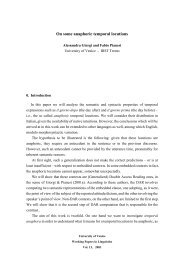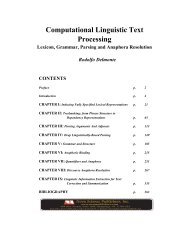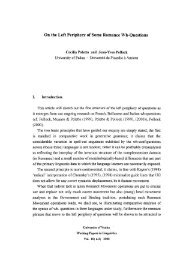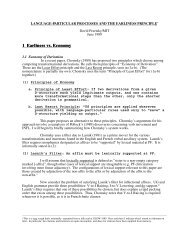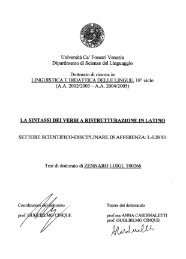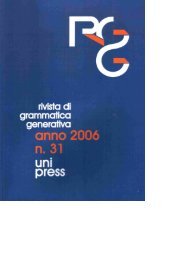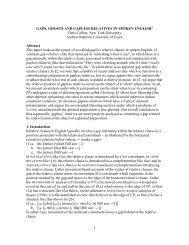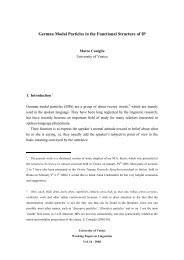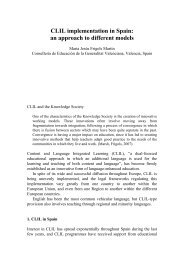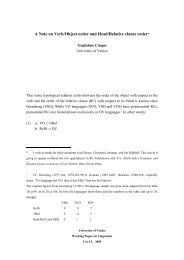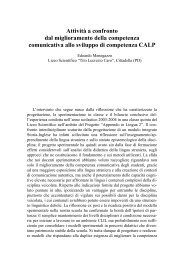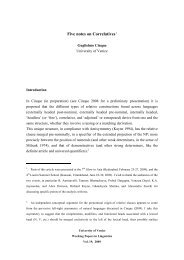A Grammar of Italian Sequence of Tense - Lear
A Grammar of Italian Sequence of Tense - Lear
A Grammar of Italian Sequence of Tense - Lear
You also want an ePaper? Increase the reach of your titles
YUMPU automatically turns print PDFs into web optimized ePapers that Google loves.
144<br />
(83) *Maria è partita domani<br />
Maria left tomorrow<br />
A <strong>Grammar</strong> <strong>of</strong> <strong>Italian</strong> <strong>Sequence</strong> <strong>of</strong> <strong>Tense</strong><br />
This sentence is ungrammatical because tomorrow places its argument, in this case the<br />
leaving event, in the future <strong>of</strong> the speaker, whereas the past tense places it in her past.<br />
Hence, the two cannot coexist.<br />
My proposal is that tomorrow cannot be used in example (82) exactly for the same<br />
reason. We know that in clauses embedded under a future the embedded event is located<br />
with respect to the subject’s coordinate, that is, with respect to the main event. Hence,<br />
the leaving is past with respect to the saying. Let’s also suppose that the context is<br />
indeed a DAR one. Therefore, the embedded event should undergo a second evaluation<br />
with respect to the speaker’s coordinate. Note that the indexical adverb already placed<br />
the event in the future <strong>of</strong> the speaker, a perfectly plausible option considering the<br />
speaker’s actual temporal location.<br />
But what if the speaker’s temporal location in the embedded clause is not provided by<br />
the utterance time, now, anymore, but is made to coincide with the subject’s one? In that<br />
case we would obtain a situation analogous to (83): The past tense on the verb locates<br />
the event in the past with respect to the subject’s temporal location –by my hypothesis<br />
the speaker’s temporal location as well– whereas the indexical tomorrow places the<br />
leaving in the speaker’s future. Therefore, it gives rise to ungrammaticality in example<br />
(82), exactly as in example (83).<br />
In what follows I will show that the speaker’s temporal coordinate is indeed presented<br />
in C, even if it is not distinguishable from the subject’s. It gives rise in fact to DAR<br />
effects detectable with anaphoric temporal locutions.<br />
Giorgi and Pianesi’s (2003) observed that anaphoric temporal locutions cannot occur in<br />
DAR contexts, and formulated the following generalization:<br />
(84) Anaphoric temporal locutions cannot be used for locating events that are in a<br />
direct relation R with the utterance event<br />
This generalization, among other things, captures the following contrast:<br />
(85) Questa mattina Gianni ha detto che Maria è partita ieri / ?* il giorno prima<br />
This morning Gianni said that Maria left(PAST) yesterday / the day before<br />
(86) Questa mattina Gianni ha detto che Maria era partita ieri /il giorno prima<br />
This morning Gianni said that Maria had left(IMPF) tomorrow/ the day before



